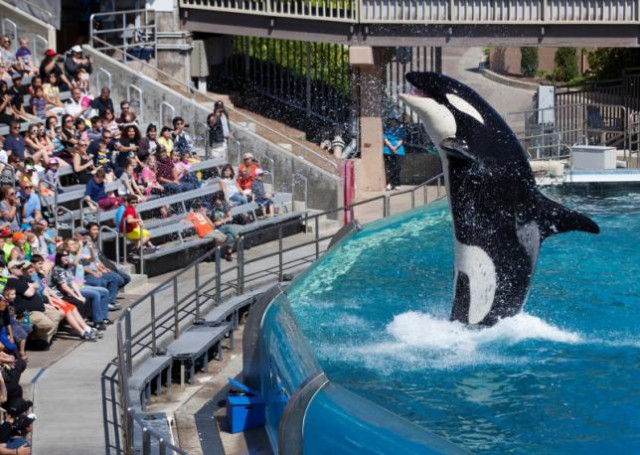SeaWorld to replace 'Shamu' killer whale show in San Diego
After widespread criticism, SeaWorld plans to replace its killer whale shows with displays focused on conservation

Visitors are greeted by an Orca killer whale as they attend a show featuring the whales during a visit to the animal theme park SeaWorld in San Diego, California March 19, 2014. PHOTO: REUTERS
Animal rights activists, pressing to end public exhibition of killer whales altogether, branded the SeaWorld announcement as little more than window-dressing designed to make continued display of the animals more palatable to the public.
The move, unveiled in a company presentation to investors, followed a vote by California regulators last month barring SeaWorld San Diego from continuing to breed the killer whales, or orcas, if it proceeds with a planned expansion of their artificial habitat.
Habitat: ‘No tolerance for illegal hunting’
SeaWorld Entertainment Inc Chief Executive Officer Joel Manby said 2016 would be the last year of the park's "current orca experience," which features the black-and-white marine predators performing various tricks at the direction of trainers.
A highlight of those shows has been a leaping orca unleashing an enormous splash onto the front rows of spectators seated in the park's outdoor Shamu Stadium arena, named for the original killer whale star of SeaWorld's performances in the 1960s and early 70s.
"In 2017 we're going to launch an all-new orca experience with a conservation theme in a more natural setting," Manby said, adding that plans were based on SeaWorld guests surveys.
"They want the San Diego whale experience to be what the animal would do in the wild," he said in response to questions. "They jump in the wild, they splash in the wild."
He did not elaborate, saying only that there would be fewer theatrics. But a company press release said the attraction would focus on the animals' natural behaviors. "The show will include conservation messaging and tips guests can take home to make a difference for orcas in the wild," it said.
Wildlife officials rescue 20 endangered cranes
There was no mention of any changes in the works for orca attractions at the company's two other US aquatic theme parks, in Orlando, Florida, and San Antonio, Texas.
Investors calling into the company's presentation did not ask about the possible financial implications of the change. But the announcement came on the heels of lackluster third-quarter earnings at SeaWorld, and its shares closed down $0.23, or 1.26%, on the New York Stock Exchange at $17.91.
THE 'BLACKFISH' EFFECT
SeaWorld has faced heated criticism and declining revenues since the release of the 2013 documentary film "Blackfish," which depicted the captivity and public exhibition of killer whales as inherently cruel.
The film, which SeaWorld has criticized as inaccurate and misleading, also explored the circumstances leading to the 2010 death of a top SeaWorld trainer, who was pulled underwater and drowned by an orca she had performed with in Florida.
Trainers have not been allowed back into the water with killer whales during SeaWorld performances since that incident.
The company has sought to counter negative publicity surrounding "Blackfish" with a public relations blitz aimed at drawing attention to SeaWorld's role in marine mammal research and its rescue and rehabilitation of animals in the wild.
Global warming puts snow leopards in a bind: study
A plan by the San Diego park to enlarge its 7 million gallon orca pool complex as part of a $100 million "Blue World" expansion drew opposition from animal rights groups and their supporters, who want to see the park's collection of 11 killer whales released into coastal sanctuaries instead.
The state Coastal Commission voted unanimously in October to permit the expansion, but only on condition that captive breeding of the whales cease, along with the transfer or sale of new whales to the park.
The company, which has said it would challenge the commission's ruling, gave no indication on Monday that it was ready to give up its orca breeding program.
SeaWorld's critics said the newly announced display plans are designed to appease a growing segment of the public that has come to regard orca shows as inhumane exploitation of intelligent creatures.
"An end to SeaWorld's tawdry and circus-style performance is inevitable, but it's actually captivity that denies these far-ranging orca the opportunity to engage in behaviors that are natural and important to them," said Ben Williamson, director of People for the Ethical Treatment of Animals (PETA).



















COMMENTS
Comments are moderated and generally will be posted if they are on-topic and not abusive.
For more information, please see our Comments FAQ